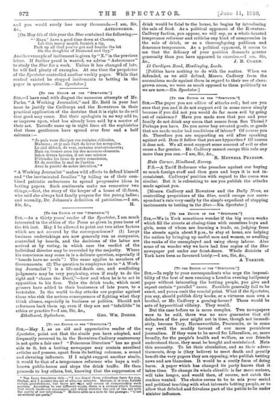[To Tax EDITOR or ass " SPECTATOR "] Sin,—May I, as
an old and appreciative reader of the Spectator, point out that the simile you have adopted, and frequently recurred to, in the Rowntree-Cadbury controversy is not quite a fair one? "Poisonous literature" has no good side to it, but a betting newspaper may contain excellent articles and possess, apart from its betting columns, a sound and elevating influence. If I might suggest another simile, it would be that of a temperance reformer who buys a well- known public-house and stops the drink traffic. He then proceeds to buy others, but, knowing that the suppression of • Van Laun translates this :—" I can dispel these ridiculous fears for you. Madam, and I possess the art of allaying scruples. Heaven, it is true, forbids certain gratifications, but there are 11111y s and means of compounding such matters. According to our different wants, there is a science which loosens that which binds our conscience, and which rectifies the evil of the act with the purity of our intentions." Moliere adds as a note to the passage: " C'est an sodlerst qui pads."
drink would be fatal to the house, he begins by introducing the sale of food. As a political opponent of the Rowntree- Cadbury faction, you appear, we will say, as a whole-hearted temperance reformer and criticise any kind of compromise in the sale of drink, or as a thoroughgoing publican and denounce temperance. As a political opponent, it seems to me that the delicacy of your position demands greater generosity than you have appeared to exercise.—I am, Sir,
&c., J. B. CoHEN, 13 Cardigan Road, Hea,dingley, Leeds.
[Politics have nothing to do with the matter. When we defended, as we still defend, Messrs. Cadbury from the accusations made against them in regard to their use of slave- grown cocoa, we were as much opposed to them politically as we are now.—En. Spectator.]














































 Previous page
Previous page